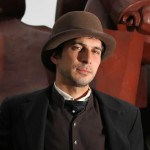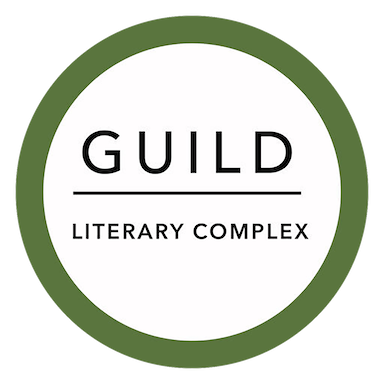
- This event has passed.
Applied Words: Broken Windows
If urban design is the language of the city, where is the story – and who tells it? In Applied Words: on Architecture and the Urban Plan, the Guild Literary Complex invites writers to examine our relationships with the built environment.
“Broken Windows,” the first reading in a series of three to continue from now until October, will take place on Tuesday, September 3, from 6pm-8pm, in the Polish Triangle located at the intersection of Division Street, Ashland Avenue, and Milwaukee Avenue. The free event will include an open mic and stories from Paul Durica, Maribel Mares, and Sarah Ross. A free afternoon workshop on “place making” will be lead by architect Katherine Darnstadt, founder of Latent Design, from 3pm-5pm. Open mic sign-up begins at 5:30 pm.
The “broken windows” social theory states that community ailments such as trash, graffiti, and loitering, when left unchecked, invite larger criminal problems. But if the “broken windows” are fixed, a community invites economic development and social prosperity. In practice, the concept can evolve into zero tolerance for behavior or people considered disruptive or unwanted. Our readers will present stories from the middle, tales that examine conflict and offer surprise as they foreground the human element in urban design.
The Applied Words series explores creative writings intersection with other fields. Ranging in discipline from art and architecture to social history and biology, Applied Words attempts to use the literary arts to enhance and/or creatively describe other fields. Applied Words: “Broken Windows” is part of summer programming by the Polish Triangle Coalition. It is co-sponsored by SOILED Magazine and generously underwritten by Studio Gang Architects.
ABOUT THE ARTISTS:
 Katherine Darnstadt is the founder and principal of LATENT DESIGN, a collaborative of individuals whose projects focus on social, economic and environmental impact beyond the building. She has been published, exhibited, and featured widely, most notably at the International Venice Biennale, Core 77 Design Awards, Chicago Ideas Week, NPR, and as the 2013 American Institute of Architects Young Architects Honor Award winner.
Katherine Darnstadt is the founder and principal of LATENT DESIGN, a collaborative of individuals whose projects focus on social, economic and environmental impact beyond the building. She has been published, exhibited, and featured widely, most notably at the International Venice Biennale, Core 77 Design Awards, Chicago Ideas Week, NPR, and as the 2013 American Institute of Architects Young Architects Honor Award winner.
 Paul Durica has an MFA in creative writing from the University of Michigan and a PhD in English from the University of Chicago. His writing has appeared in Poetry, The Chicagoan, Tin House, Mid-American Review, and Indiana Review among other places. With Bill Savage, he edited Chicago by Day and Night: The Pleasure Seeker’s Guide to the Paris of America. He is the founder of Pocket Guide to Hell, a series of free and interactive talks, walks, and reenactments that deal with Chicago’s past.
Paul Durica has an MFA in creative writing from the University of Michigan and a PhD in English from the University of Chicago. His writing has appeared in Poetry, The Chicagoan, Tin House, Mid-American Review, and Indiana Review among other places. With Bill Savage, he edited Chicago by Day and Night: The Pleasure Seeker’s Guide to the Paris of America. He is the founder of Pocket Guide to Hell, a series of free and interactive talks, walks, and reenactments that deal with Chicago’s past.
 Maribel Mares is an author, educator, and organizer. She is a founding member of the Division Collective, a salon series featuring emerging writers, artists, musicians, architects, designers, and thinkers. She is also the co-creator of Kid City Chicago. Her writing explores the cultural and regional identity of Mexican American families.
Maribel Mares is an author, educator, and organizer. She is a founding member of the Division Collective, a salon series featuring emerging writers, artists, musicians, architects, designers, and thinkers. She is also the co-creator of Kid City Chicago. Her writing explores the cultural and regional identity of Mexican American families.
 Sarah Ross is an artist and organizer. She is a co-organizer of the Prison and Neighrborhood Arts Project, a new art and humanities initiative at Stateville Prison. She is the recipient of grants from the Propeller Fund, Graham Foundation, and the University of California Institute for Research in the Arts. Ross’ work in sculpture, video, and photo visualizes struggles around space, class, access, and gender.
Sarah Ross is an artist and organizer. She is a co-organizer of the Prison and Neighrborhood Arts Project, a new art and humanities initiative at Stateville Prison. She is the recipient of grants from the Propeller Fund, Graham Foundation, and the University of California Institute for Research in the Arts. Ross’ work in sculpture, video, and photo visualizes struggles around space, class, access, and gender.
Co-sponsor:
SOILED – a dirty architecture magazine – tells messy stories about architecture. The stories are unexpected, they’re accessible, and they instigate mischief. Collectively, the stories reach across disciplines to bring a diverse group of people into a public conversation about architecture. SOILED is published twice a year on each solstice. It is an interactive, physical artifact, simultaneously disposable and precious. More information at: www.soiledzine.org
Underwriting partner:
MacArthur Fellow Jeanne Gang is the founder of Studio Gang Architects, a Chicago-based collective of architects, designers, and thinkers practicing internationally. Jeanne uses architecture as a medium of active response to contemporary issues and their impact on human experience. Each of her projects resonates with its specific site and culture while addressing larger global themes such as urbanization, climate, and sustainability. With this approach, Studio Gang has produced some of today’s most innovative and visually compelling architecture. http://studiogang.net/
ABOUT POLISH TRIANGLE COALITION:
The Polish Triangle Coalition is formed to improve the surroundings around the area bounded by Ashland, Milwaukee, and Division Street. Neighborhood community groups, merchants and local schools are working to create a more pleasant and lively area at the Polish Triangle. www.polishtrianglecoalition.org


